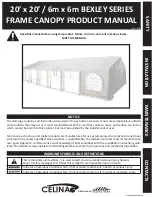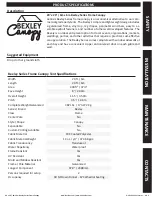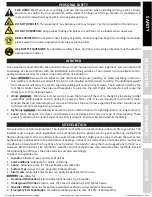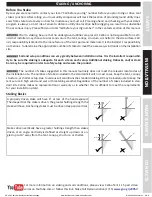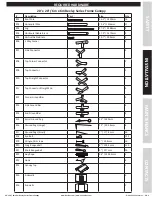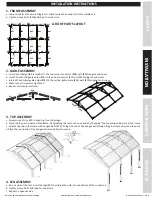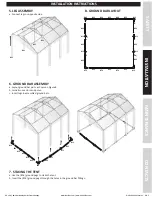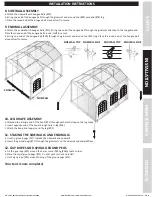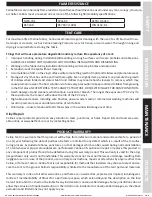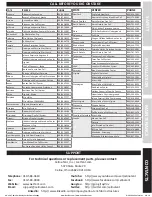
20’ x 20’ / 6m x 6m Bexley Series Frame Canopy
www.GetTent.com / www.CelinaTent.com
PG.3
© 2013 Celina Tent Inc.
SAFETY
MAINTENANCE
INS
TALLA
TION
CONT
AC
TS
Site selection is extremely important. The installer must adhere to local building codes and fire regulations. The
installer must evaluate each installation site and determine the proper securing and anchoring method and
device appropriate for the conditions. Some soils require different staking or securing methods than what may
be/have been purchased with the standard tent package. Celina Tent’s instructions, YouTube videos, and Layout
Handbook summarize all the functions of each product, the rules for using them and suggestions for their use.
However, field situations, site conditions, weather and local experience may mandate other methods. Review
the following conditions at the proposed site and plan accordingly.
The best site qualities are:
•
Location:
Elevated, level, and clear of debris
•
Soil Conditions:
Adequate for stable anchoring
•
Space:
Adequate space for the perimeter and stake lines
•
Surface Type:
Grass, Gravel, Concrete, Asphalt, Wood
•
Site Access:
Materials and services can easily be delivered to the site
Also allow for:
•
Overhead Obstructions:
Electrical/telephone lines, tree branches
•
Underground Utilities:
Electric, Gas, Oil, Steam, Telephone, CATV, Water, Sewer
•
Weather Effects:
Monitor for extreme weather conditions and evacuate if necessary
•
Emergency Exit Capabilities:
Provide evacuation routes in case of a fire or bad weather
SITE SELECTION
STAY ALERT:
Watch what you are doing, and use common sense when installing/striking a tent, canopy,
structure, or shelter. Do not setup/strike while under the influence of drugs, alcohol, or medication. A
moment of inattention may result in serious personal injury.
DO NOT OVER LIFT:
The equipment may be heavy and may require 2 or more people to lift and move.
DO NOT OVERREACH:
Keep proper footing and balance at all times. Use a ladder when necessary.
DRESS PROPERLY:
Do not wear loose clothing or jewelry. Contain long hair. Keep hair, clothing, and hands/
gloves away from power equipment and snag or pinch points.
USE SAFETY EQUIPMENT:
Eye protection, safety shoes, hard hats, or hearing protection must be used for
appropriate conditions.
Since weather is unpredictable, the installer/end user must incorporate their own judgment, common sense and
knowledge of local conditions with the installation instruction guidelines. The installer is responsible for antici
-
pating weather severity for proper time and method of installation.
•
Rain:
Rain water can collect on the tent fabric and cause ‘ponding’ or ‘water pocketing’ under cer
-
tain weather conditions, especially if the tent is not installed and tensioned correctly. The additional weight
from the water will cause the tent to sag and ponding will continue to get worse. The weight can destroy the
tent fabric and/or cause the poles and baseplates to sink into the soil. Highly saturated soil will cause the
stakes to lose their holding power.
•
Wind:
Wind or wind and rain can cause the tension of the tent to change by loosening ratchet
assemblies, pulling stakes, and or causing the poles to shift or sink. It is very important to do routine main
-
tenance checks and maintain proper tension on the tent top at all times especially if weather conditions are
such that ratchets are beginning to loosen
•
Lightning:
Immediately evacuate the tent until the chance of a lightning strike is no longer present.
•
Snow:
Tents, canopies, structures, and shelters are not designed to carry any type of snow loading. These
products should not be used if snow of any kind is present, and must be evacuated immediately.
PERSONAL SAFETY
WEATHER

